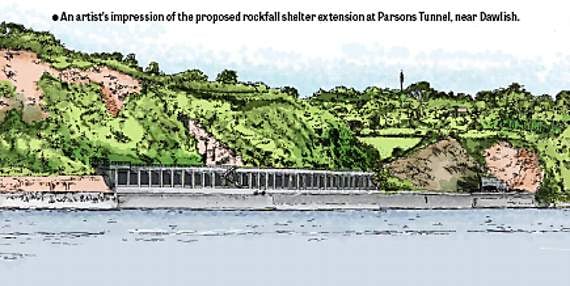Following the authority’s okay, Network Rail is now hoping to begin construction work on the 209m-long extension of the rockfall shelter north of Parsons Tunnel in August.
The tunnel extension will help protect trains against falling rocks along a vulnerable section of railway that links communities across the South West with the rest of the country.
Parsons Tunnel was previously extended 100 years ago, and Network Rail will extend that further by providing a rockfall shelter in modern materials, but with open sides rather than the brick built enclosed tunnel extension.
Once started, construction of the £37.4m project is expected to take around a year to complete.
Preparatory work at the top of the cliffs overlooking this stretch of railway began in March whereby Network Rail engineers started cutting back some of the vegetation. This work is being closely monitored to ensure the least disruption for wildlife habitats and biodiversity.
This rockfall shelter, which is the third phase of work as part of Network Rail’s South West Rail Resilience Programme (SWRRP) and follows the two sections of new sea wall in Dawlish, is critical to ensuring the resilience of the railway between Dawlish and Teignmouth for generations to come and protecting this critical route from falling debris.
Chris Pearce, Network Rail’s Western route interim director, said: ‘We are pleased that Teignbridge District Council has approved this third section of the South West Rail Resilience Programme and thank members and officers for their thorough reviews of our plans.
‘The coastal location of the railway in south Devon is truly stunning but it also presents its biggest challenge with the sea on one side and steep cliffs on the other.
‘The existing rockfall shelter has proven its effectiveness for a century and so this modern extended structure will protect the railway for generations to come alongside a section of cliff that is becoming increasingly hazardous from rock falls.’




